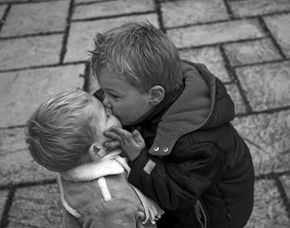The Effects of Kissing
While researchers aren't exactly sure how or why people started kissing, they do know that romantic kissing affects most people profoundly. The Kinsey Institute describes a person's response to kissing as a combination of three factors:
- Your psychological response depends on your mental and emotional state as well as how you feel about the person who is kissing you. Psychologically, kissing someone you want to kiss will generally encourage feelings of attachment and affection. If you're kissing someone you don't like, or you're kissed against your will, your psychological response will be completely different.
- The culture in which you grew up plays a big part in how you feel about kissing. In most Western societies, people are conditioned to, look forward to and enjoy kissing. The behavior of the people around you, depictions in the media and other social factors can dramatically affect how you respond to being kissed.
These factors play a part in all kisses, not just those that are romantic in nature. In other words, when a mother kisses her child's bruise to make it feel better, psychological, physical and social factors play a part in both people's reactions. The same is true when friends kiss as a greeting, worshippers kiss religious symbols or siblings kiss and make up after an argument. Even though some kisses are platonic and others are romantic, they generally have one thing in common - they are inspired by and tend to inspire feelings we think of as positive.
Advertisement
Regardless of exactly how people got the idea to kiss or what they mean when they do it, anthropologists are pretty sure that people started kissing thousands of years ago. We'll look at the history of kissing in more detail next.
